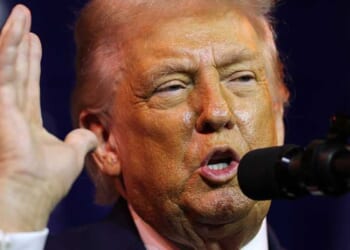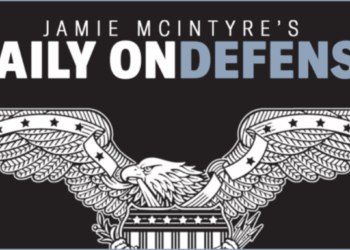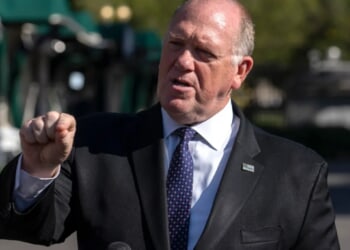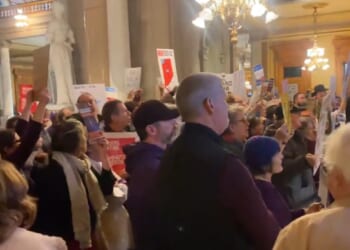Liberals in the news media and Congress, in a major reversal, are staunchly defending free speech.
This is typical of a group that finds itself no longer in power. Democrats lost the White House last November, and their hold on corporate America vanished. Liberals, meanwhile, have come to realize that they no longer control 100% of the cultural levers.
Back when they controlled the executive branch and Congress, though — when Hollywood and TV executives were fully on their team, and when Big Tech followed Democrats’ marching orders — much of the Left had no interest in free speech.
YOU EITHER BELIEVE IN FREE SPEECH OR YOU DON’T
They used their power to silence political opponents, they tried to curtail the First Amendment, and failing that, they argued that conservative opinions and facts did not deserve First Amendment protection. Before one of their comedians was taken off the air for a couple of nights, Democrats and the TV networks were vocally on the side of speech constraints.
The thing about free speech is that it’s supposed to be a principle. That is, it’s supposed to hold in all sorts of circumstances, regardless of who is on what side. It’s a rule of the road.
The American Left — the networks, the newspapers, the elected officials — are correct today to invoke the idea of free speech. But all the evidence suggests they do not hold free speech as a principle.
On Monday night, September 15, comedian Jimmy Kimmel used his monologue to seemingly blame MAGA for the assassination of Charlie Kirk.
“We hit some new lows over the weekend with the MAGA gang desperately trying to characterize this kid who murdered Charlie Kirk as anything other than one of them,” Kimmel said.
Brendan Carr, Trump’s appointee to head the Federal Communications Commission, responded aggressively. He called Kimmel’s remarks, a “concerted effort to lie to the American people.”
“We can do this the easy way or the hard way,” Carr warned. “These companies can find ways to change conduct and take action, frankly, on Kimmel, or there’s going to be additional work for the FCC ahead.”
Then ABC pulled Kimmel off the air for a week.
Some Trump defenders scrambled to point out that ABC acted on its own, and argued that the network would have suspended Kimmel one way or another — an unprovable counterfactual. Nevertheless, Carr was a government official with the power to harm ABC and its parent company, and he was “jawboning” ABC into punishing an anchor for the content of his speech.
When ABC returned Kimmel to the air after a few days, President Donald Trump attacked the network and threatened new legal action against it.
Is this government censorship? That’s a semantic debate. The government never directly punished Kimmel for his viewpoint, and ABC decided to suspend him. Also, nobody practiced “prior restraint,” the most serious form of censorship, which involves preventing a speaker from expressing his views in the first place.
But when a government holds such vast power to punish or reward a corporation, and powerful government officials lean on a corporation to punish its employees, that certainly violates the principle of free speech.
Democrats are right to complain. But they have no credibility to do so.
For more than a decade, the Democrats’ primary crusade was to curb political speech. “Campaign-finance reform,” they called it.
Republicans were not innocent here. John McCain was a chief author of the 2002 “Bipartisan Campaign Reform Act,” and notably, after losing the nomination under the less restrictive rules in 2000, he won the first open Republican nomination process under his rules. Lose the game; rewrite the rules; win the game.
The McCain-Feingold bill did not limit how much money candidates could raise or spend. It protected incumbents by banning massive gifts and thus favoring those who could call on lobbyists to bundle a bunch of $10,000 contributions from corporate political action committees.
Most importantly, the law made it illegal in most cases for a critic to take to the airwaves and criticize an incumbent within 60 days of a primary election or 90 days of a general election. Hillary Clinton’s campaign was free to run an ad attacking the Religious Right, but if the Christian Coalition tried to run an ad in response, that would be an illegal “electioneering communication.”
The law banned all organizations — corporations, unions, non-profits — from spending even a dime on electioneering communications too close to election time. In theory, this was supposed to stop Exxon-Mobil from running attack ads on a climate-crusading politician. In practice, it meant Americans couldn’t gather their resources to collectively criticize those in power.
When Citizens United, a conservative activist group, created a documentary titled Hillary: The Movie, it was clear that broadcasting the movie and advertising for it on television would be banned by the BCRA. The Supreme Court found that this was unconstitutional abridgement of the freedom of speech. The main purpose of the First Amendment’s free speech protection is, arguably, to protect criticism of powerful politicians, and campaign-finance reform banned that explicitly.
Democrats complained about the Citizens United decision, and in the years following the ruling, many of them, including Hillary Clinton, demanded a constitutional amendment to once again outlaw electioneering such as Hillary: The Movie. That is, they spent much of a decade campaigning to curtail the First Amendment in order to protect themselves from criticism.
These are the very people today crowing about free speech.
Journalists take pride in the fact that our industry is the only industry explicitly mentioned in the First Amendment. Many journalists, though, seem to think the First Amendment goes too far.
The media solidarity behind ABC and Kimmel stands in stark contrast to the media attacks on free speech and competitors in recent years.
After the 2020 election and the Trump-inspired January 6 riots, CNN media columnist Oliver Darcy launched a campaign to get Fox News off the air because he found Fox’s content harmful and objectionable.
“Big Tech takes a lot of heat for distributing disinformation to millions,” wrote Darcy. “But what about TV carriers? Why do they escape scrutiny for beaming into millions of homes propagandists who recklessly use their platforms to spread lies and conspiracy theories?”
He was talking about CNN’s rival Fox News. Darcy called the cable carriers to ask them why they weren’t kicking Fox News off the air.
Darcy’s colleagues joined in the campaign, calling for governments and corporations to curb “information pollution.”
“Reducing a liar’s reach is not the same as censoring freedom of speech,” said CNN’s Brian Stelter. “Freedom of speech is different than freedom of reach.” This is literally the argument made by those trying to get Kimmel off the air.
At the same time, Neoconservative-turned-liberal-columnist Max Boot argued that Biden “needs to reinvigorate the FCC to slow the lies and sedition from Fox and other right-wing broadcasters.”
More recently, CBS News decided to focus on the supposed threat from free speech.
Vice President J.D. Vance travelled to Munich earlier this year and told European leaders. “In Britain and across Europe, free speech, I fear, is in retreat.” He listed specific examples of authorities outlawing prayer too close to abortion clinics and other obvious attacks on free speech.
CBS responded by airing a glowing profile of Europe’s censors.
Then CBS anchor Margaret Brennan scolded Secretary of State Marco Rubio for Vance’s remarks: “He lectured about what he described as censorship, mainly focusing, though, on including more views from the Right.”
When Rubio pointed out that what Vance “described as censorship” was, in fact, censorship, Brennan persisted. “Well, he was standing in a country where free speech was weaponized to conduct a genocide, and he met with the head of a political party that has far-right views and some historic ties to extreme groups. The context of that was changing the tone of it. And you know that, that the censorship was specifically about the Right.”
Brennan’s objection to free speech, then, is two-fold: (1) The speech Vance was defending came from “the Right,” and (2) Vance was defending free speech in Germany.
The latter point is ahistorical nonsense. Brennan implied that Nazism was just an extreme form of free speech.
But her repeated point, that Vance was wielding the “free speech” shield in defense of “the Right” implied something much of the liberal media seem to believe but not typically say: Free speech is for ideas I like, not for ideas I don’t. Again, that’s not a principle of free speech. It’s a utilitarian argument they use when they’re out of power.
Elected Democrats are leading the defense of Kimmel and the attack on Carr and Trump this week. But again, this is hardly coming from a place of consistent commitment to free speech.
The Biden Administration’s State Department funded a censorship-industrial complex that tried to cut off advertising funding to conservative media, such as the Washington Examiner. The Examiner made this state-funded “exclusion list” for running an op-ed, noting that conservative women are happier than liberal women.
Just before the Kirk shooting, when Republicans held a hearing on the free-speech crackdowns in the UK and Europe, Rep. Jaimie Raskin (D-MD) dismissed the notion that there was any such thing.
“The Republicans are vilifying robust European liberal democracies simply for engaging in the kind of line-drawing exercises that we engage in under our First Amendment….” One exercise in “line-drawing” Raskin defended was that you may not silently pray within 150 meters of an abortion clinic, even out of sight of everyone entering the clinic.
Raskin was implicitly endorsing Europe’s and the U.K.’s crackdowns on prayer and uncouth opinions just days before his party found religion in free speech.
During the Biden administration, Minnesota Gov. Tim Walz asserted, “There’s no guarantee to free speech for misinformation or hate speech….” This is factually false. “Hate speech” is protected by the First Amendment, the Supreme Court has repeatedly found.
When pressed on free speech during his 2024 campaign for vice president, Walz asserted, “You can’t yell fire in a crowded theater. That’s the test.” That’s also wrong. Both of these errors pointed in the same direction: toward government bans on speech he dislikes.
Rep. Alexandria Ocasio-Cortez (D-NY), a possible Democratic presidential nominee in the near future, has also called for censorship. She argued in a 2021 social media video.
“We’re going to have to figure out how we rein in our media environment so that you can’t just spew disinformation and misinformation… It’s one thing to have differing opinions, but it’s another thing entirely to just say things that are false.”
AOC popularized one favorite liberal argument against free speech: Some political speech is indirectly incitement, and incitement to violence is not protected by the First Amendment. “Stochastic terrorism” was the wonky-sounding term for this. Her example of stochastic terrorism was Tucker Carlson, whom she says was inciting violence against her “every time that dude puts my name in his mouth.”
Again, free speech stops, Democrats argue, when it comes to criticizing incumbent politicians too harshly.
When the New York Times joined in this “stochastic terrorism” scare, two examples they gave were conservatives attacking transgender ideology. They quoted a Marco Rubio ad stating, “The radical left will destroy America if we don’t stop them. They indoctrinate children and try to turn boys into girls.” They also quoted a conservative organization stating “Transgenderism is killing kids.”
Expressing these opinions in public, the Times argued, leads indirectly but predictably to violence against transgender people. That’s an excuse for prior restraint against these opinions.
Perhaps the most blatant uprising of censorship in recent years was the Biden administration’s jawboning of tech platforms to throttle or block content during the pandemic.
Facebook, Google, and Twitter, we have learned in the past year, received constant pressure from the Biden administration to throttle what they considered dangerous speech.
They gave in.
Of course, some of what was branded as misinformation turned out to be true or at least a reasonable opinion. Questioning the efficacy of the vaccines was considered dangerous, because it could deter people from getting the vaccine. Yet we learned over the course of 2021 that the vaccine did not in fact control the spread of the virus.
When any conservative suggested in 2020 or 2021 that the virus originating in Wuhan might have come out of the virology lab in Wuhan, all sorts of media outlets called it a “conspiracy theory” and misinformation. Subsequent evidence has corroborated that theory.
AFTER CHARLIE KIRK, A GREAT AWAKENING?
Those were extraordinary times with an extraordinary threat, some say today. Again, the same exact argument could be deployed to justify driving Kimmel off the air: Charlie Kirk was just assassinated by a young man who found his views too hateful to tolerate, and a national celebrity was falsely blaming the shooting on the half of America he already hates.
In a sense, Democrats should be applauded for their hypocrisy. If an authoritarian suddenly adopts the stance of freedom, that’s good. It’s unfortunate that we can expect this belief in free speech to evaporate when they are back in power.















